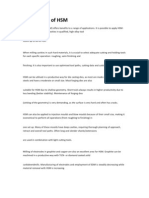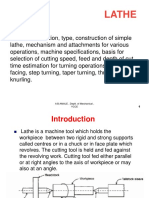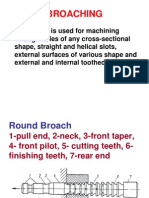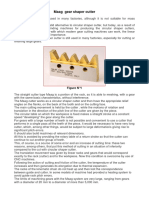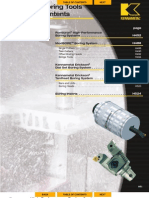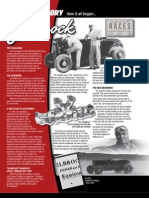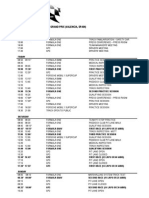0 ratings0% found this document useful (0 votes)
505 viewsSetup Guide GTR2 2
Setup Guide GTR2 2
Uploaded by
cjohananThis document provides a 21-step guide for setting up a car in the racing simulation GTR2. It outlines various elements of the car setup that can be adjusted, including tires, radiator opening, gear ratios, brakes, suspension, and aerodynamics. For each element, it lists indicators to monitor and suggested actions to take based on the indicators. The goal is to methodically work through each element, making small adjustments and testing the effects until the ideal setup is achieved. Proper concentration is important as many settings are subtle, and setups should be saved at each step for reference.
Copyright:
© All Rights Reserved
Available Formats
Download as PDF, TXT or read online from Scribd
Setup Guide GTR2 2
Setup Guide GTR2 2
Uploaded by
cjohanan0 ratings0% found this document useful (0 votes)
505 views3 pagesThis document provides a 21-step guide for setting up a car in the racing simulation GTR2. It outlines various elements of the car setup that can be adjusted, including tires, radiator opening, gear ratios, brakes, suspension, and aerodynamics. For each element, it lists indicators to monitor and suggested actions to take based on the indicators. The goal is to methodically work through each element, making small adjustments and testing the effects until the ideal setup is achieved. Proper concentration is important as many settings are subtle, and setups should be saved at each step for reference.
Original Description:
Comprehensive setup guide for GTR 2
Copyright
© © All Rights Reserved
Available Formats
PDF, TXT or read online from Scribd
Share this document
Did you find this document useful?
Is this content inappropriate?
This document provides a 21-step guide for setting up a car in the racing simulation GTR2. It outlines various elements of the car setup that can be adjusted, including tires, radiator opening, gear ratios, brakes, suspension, and aerodynamics. For each element, it lists indicators to monitor and suggested actions to take based on the indicators. The goal is to methodically work through each element, making small adjustments and testing the effects until the ideal setup is achieved. Proper concentration is important as many settings are subtle, and setups should be saved at each step for reference.
Copyright:
© All Rights Reserved
Available Formats
Download as PDF, TXT or read online from Scribd
Download as pdf or txt
0 ratings0% found this document useful (0 votes)
505 views3 pagesSetup Guide GTR2 2
Setup Guide GTR2 2
Uploaded by
cjohananThis document provides a 21-step guide for setting up a car in the racing simulation GTR2. It outlines various elements of the car setup that can be adjusted, including tires, radiator opening, gear ratios, brakes, suspension, and aerodynamics. For each element, it lists indicators to monitor and suggested actions to take based on the indicators. The goal is to methodically work through each element, making small adjustments and testing the effects until the ideal setup is achieved. Proper concentration is important as many settings are subtle, and setups should be saved at each step for reference.
Copyright:
© All Rights Reserved
Available Formats
Download as PDF, TXT or read online from Scribd
Download as pdf or txt
You are on page 1of 3
STEP ELEMENT INDICATOR (Information or Comportment) ACTION to take Difficulty
_ Change GTR2's default setup for your car X
_ Choose your tires (depending on race length and weather) X
_ Choose the radiator opening (depending on race length and external temperature) X
_ Choose revolution limits (depending on race length and external temperature) X
_ Choose the initial fuel quantity (depending on race length and weather) X
Engine reaches revolution limits in the longest straight in 6th gear Lengthen 6th gear and re-arrange 2nd to 5th gear to get even spacing between 1st & 6th gear
Engine does not reach revolution limits in the longest straight in 6th gear Shorten 6th gear and re-arrange 2nd to 5th gear to get even spacing between 1st & 6th gear
Engine reaches the revolution limit at the end of the longest straight None
Brake temperature gets lower than 300C in the straights Diminish brake duct openings
Brake temperature goes over 600C while braking Increase brake duct openings
Brake temperatures are always between 300 and 600C None
Interior Tire Temperature - Exterior Tire Temperature < 0C Increase negative camber
Interior Tire Temperature - Exterior Tire Temperature > 5C Decrease negative camber
0C < Interior Tire Temperature - Exterior Tire Temperature < 5C None
Center of tire Colder than Exterior and Interior Tire Temperature Increase Tire Pressure
Center of tire Warmer than Exterior and Interior Tire Temperature Lower Tire Pressure
Center Tire Temperature is Between Exterior and Interior Tire temperature None
Front wheels lock first while braking (Tendency for the car to go straight off track) Adjust bias towards rear
Rear wheels lock first while braking (Tendency for the car to spin) Adjust bias towards front
Front wheels and rear wheels lock at the same time None
Steering reaches the end stop in the sharpest turn Increase Steering Lock
Steering at 50% in the sharpest turn Decrease Steering Lock
Steering at 90% in the sharpest turn None
SETUP GUIDE FOR GTR2 : SETUP YOUR CAR IN 21 STEPS
Author : LmS (lms_oid@libertysurf.fr) English Translation : Eden7c Version : 0.62 Beta
5 STEERING LOCK
CAMBER INITIAL SETUP
TIRE PRESSURE INITIAL
SETUP
3
This Setup guide is intended for the GT racing car simulation on PC : GTR2. Its intent is to give a simple and accessible methodology for a pilot with basic knowledge to delve in them. The guide presented
in a table form will be covering the different settings that can be adjusted on your car each in turn. The ideal starting point to work from is the games default setup. The first thing you should do is to go get
use to it on track without changing anything except the gear ratios to adapt them to the chosen circuit. Next, once you are lapping consistently, we are going to work on each aspect of the setups, STEP by
STEP modifying one parameter at a time. This guide is intended for the simulation mode where no aids interfere with the cars reaction: The feedback from your modification will be at its maximum.
DEFAULT SETUP 0
Each modification needs to be followed by a few laps to validate its positive or negative effect on the INDICATORS. These INDICATORS can be given in an explicit manner (tire temperature for example) or
in an implicit manner (oversteering tendency for example). To keep it simple the table will list for each INDICATOR an ACTION to take.
Each STEP is divided amongst numerous ELEMENTS to configure, once no more ACTIONS can be taken on a given ELEMENT you will be able to consider that configuration done. Each STEPs difficulty is
given with the color of the arrow in the rightmost column.
4 BRAKE BIAS
GEAR BOX 1
2 BRAKE DUCT
Last recommandations :
+ You need to be comfortably set and in a calm environment. Concentrate
on the task: most of the settings you are going to work on are hardly
perceptible without good concentration.
+ Save the setup at each STEP with a clearly defined name (ex.
993RS_Race_STEP14.svm).
+ If the modification doesnt improve the INDICATOR, move back one
step.
+ If the modification improves the INDICATOR, try going further in that
direction to reach the point where you should stop.
+ Take note of your lap times to validate the progress of your setup.
In Green => Goal to obtain in tweaking the setup
In Red => Increases tire wear
In Blue => Diminishes tire wear
= Visual = Motec = Comportment
Easy setup Average setup Hard setup
Indicator Type :
Last recommendations :
+ You need to be comfortably set and in a calm environment. Concentrate
on the task: most of the settings you are going to work on are hardly
perceptible without good concentration.
+ Save the setup at each STEP with a clearly defined name (ex.
993RS_Race_STEP14.svm).
+ If the modification doesnt improve the INDICATOR, move back one
step.
+ If the modification improves the INDICATOR, try going further in that
direction to reach the point where you should stop.
+ Take note of your lap times to validate the progress of your setup.
In Green => Goal to obtain in tweaking the setup
In Red => Increases tire wear
In Blue => Diminishes tire wear
= Visual = Motec = Comportment
Easy setup Average setup Hard setup
Indicator Type :
Good propulsion but car understeers under power Decrease power
Lack of propulsion exiting corners Increase power
Good balance between understeer / Propulsion on corner exit None
Stable braking but lift off understeer Decrease coast
Unstable braking, lift off oversteer Increase coast
Good balance between understeer / Braking stability None
Car too nervous transitioning from braking / Acceleration Decrease preload
car not enough responsive transitioning from braking / Acceleration Increase preload
Good responsiveness in the Braking / Accelerating transition None
Fast track (type Enna Pergusa or Monza) Front splitter at 1
All other tracks Front splitter at 2
Understeering car in a fast curve (more than 120 kph) Decrease rear wing
Oversteering car in a fast curve (more than 120 kph) Increase rear wing
Car is neutral or slightly oversteering in a fast curve None
Engine reaches revolution limits in the longest straight in 6th gear Lengthen 6th gear and re-arrange 2nd to 5th gear to get even spacing between 1st & 6th gear
Engine does not reach revolution limits in the longest straight in 6th gear Shorten 6th gear and re-arrange 2nd to 5th gear to get even spacing between 1st & 6th gear
Engine reaches the revolution limit at the end of the longest straight None
Steering soft, limpy / Not enough feedback / Car understeering Increase caster
Steering too firm / Car unstable in fast curves Decrease caster
Stable car and steering as desired None
Turning in is hard Increase opening (Negative value)
Lacking straight line stability Decrease opening
Good balance between turn-in / straight line stability None
Looking for faster top speed Decrease opening
Rear-end instability in a straight Increase opening
Good stability for the rear-end in a straight None
Motec analyser shows that the car is hitting the ground Increase ride height keeping rear 10 to 20 mm higher than front
Motec analyser shows that the car is too high Decrease ride height keeping rear 10 to 20 mm higher than front
Motec analysis shows that the car is at its lowest without touching ground. None
Interior Tire Temprature - Exterior Tire Temperature < 0C Increase negative camber
Interior Tire Temperature - Exterior Tire Temperature > 5C Decrease negative camber
0C < Interior Tire Temperature - Exterior Tire Temperature < 5C None
Center of tire Colder than Exterior and Interior Tire Temperature Increase Tire Pressure
Center of tire Warmer than Exterior and Interior Tire Temperature Lower Tire Pressure
Center Tire Temperature is Between Exterior and Interior Tire temperature None
Imprecise steering in slow curves Increase front ARB
Need more grip in slow curves Decrease front ARB
Good compromise between grip / steering accuracy in slow curve None
Car understeers in slow curve Increase rear ARB
Car oversteers in slow curve Decrease rear ARB
Neutral car handling in a slow curve None
Interior Tire Temeprature - Exterior Tire Temperature < 0C Increase negative camber
Interior Tire Temperature - Exterior Tire Temperature > 5C Decrease negative camber
0C < Interior Tire Temperature - Exterior Tire Temperature < 5C None
Center of tire Colder than Exterior and Interior Tire Temperature Increase Tire Pressure
Center of tire Warmer than Exterior and Interior Tire Temperature Lower Tire Pressure
Center Tire Temperature is Between Exterior and Interior Tire temperature None
9 CASTER
REAR TOE IN/OUT
10
FRONT TOE IN/OUT
8 GEAR BOX
7
SPLITTER
WING
RIDE HEIGHT (DEFAULT
SETUP)
11
12
CAMBER
TIRE PRESSURE
TIRE PRESSURE
14
CAMBER
FRONT ANTI ROLL BAR
13
REAR ANTI ROLL BAR
6
DIFFERENTIAL POWER
DIFFERENTIAL PRELOAD
DIFFERENTIAL COAST
Car is too soft does not react promptly to controls Harden front and rear springs
Car is too nervous and GLOBALLY lacks grip Soften front and rear springs
Car is responsive and steady None
Car is GLOBALLY understeering (middle of curve with no gas or brakes applied) Harden rear springs or soften front springs
Car is GLOBALLY oversteering (middle of curve with no gas or brakes applied) Harden front springs or soften rear springs
Car is GLOBALLY neutral (middle of curve with no gas or brakes applied) None
Motec analyser shows that the car is hitting the ground Increase ride height keeping rear 10 to 20 mm higher than front
Motec analyser shows that the car is too high Decrease ride height keeping rear 10 to 20 mm higher than front
Motec analysis shows that the car is at its lowest without touching ground. None
Interior Tire Temperature - Exterior Tire Temperature < 0C Increase negative camber
Interior Tire Temperature - Exterior Tire Temperature > 5C Decrease negative camber
0C < Interior Tire Temperature - Exterior Tire Temperature < 5C None
Center of tire Colder than Exterior and Interior Tire Temperature Increase Tire Pressure
Center of tire Warmer than Exterior and Interior Tire Temperature Lower Tire Pressure
Center Tire Temperature is Between Exterior and Interior Tire temperature None
Weight transfer too fast resulting in grip lost Slightly harden both front and rear
Weight transfer too slow / Car too nervous in curves Slightly soften both front and rear
Car understeers in turn entry and turn exit Harden rear or soften front
Car oversteers in turn entry and turn exit Harden front or soften rear
Balanced weight transfers and neutral car handling in curves None
Bumpy track /Lost of adherence over bumps and kurbs Slightly soften both front and rear
Car bounces over bumps resulting in a lost of grip Slightly harden both front and rear
Car understeers over bumps Harden rear or soften front
Car oversteers over bumps Harden front or soften rear
Balanced car and neutral handling over bumps None
Motec analyser shows that the car is hitting the ground Increase ride height keeping rear 10 to 20 mm higher than front
Motec analyser shows that the car is too high Decrease ride height keeping rear 10 to 20 mm higher than front
Motec analysis shows that the car is at its lowest without touching ground. None
Even if ride height is properly adjusted, the car touches on some bumps Install some packers to prevent ground contacts
Car never touches ground even on bumps None
Interior Tire Temperature - Exterior Tire Temperature < 0C Increase negative camber
Interior Tire Temperature - Exterior Tire Temperature > 5C Decrease negative camber
0C < Interior Tire Temperature - Exterior Tire Temperature < 5C None
Center of tire Colder than Exterior and Interior Tire Temperature Increase Tire Pressure
Center of tire Warmer than Exterior and Interior Tire Temperature Lower Tire Pressure
Center Tire Temperature is Between Exterior and Interior Tire temperature None
19 RIDE HEIGHT
20 PACKERS
16 RIDE HEIGHT
17
CAMBER
TIRE PRESSURE
18
SHOCK ABSORBERS
BUMP/REBOUND
FAST
SHOCK ABSORBERS
BUMP/REBOUND
SLOW
SPRINGS (CAR
BALANCE)
15
SPRINGS (GLOBAL
SETTING)
21
CAMBER
TIRE PRESSURE
You might also like
- Sae Technical Paper Series: Lonny L. Thompson, Jon K. Lampert and E. Harry LawDocument12 pagesSae Technical Paper Series: Lonny L. Thompson, Jon K. Lampert and E. Harry LawSrikanth SridharanNo ratings yet
- Kerney & Trecker AC, CH, &, CHL OperatorsManualDocument27 pagesKerney & Trecker AC, CH, &, CHL OperatorsManualDavid100% (1)
- Circular Motion - Wikipedia, The Free EncyclopediaDocument9 pagesCircular Motion - Wikipedia, The Free EncyclopediaAkshat TyagiNo ratings yet
- Theory of Metal CuttingTool GeometryDocument25 pagesTheory of Metal CuttingTool GeometryNisha SharmaNo ratings yet
- Universal Centre Lathes: TRENS, A. S., Súvoz 1, 911 32 Trenãín WWW - Trens.sk Telephone: +421/32/7412 620Document2 pagesUniversal Centre Lathes: TRENS, A. S., Súvoz 1, 911 32 Trenãín WWW - Trens.sk Telephone: +421/32/7412 620adham66100% (1)
- US Forestry HandTools For TrailWork4Document8 pagesUS Forestry HandTools For TrailWork4RockWagonNo ratings yet
- Chips Single PT Cutting ToolDocument4 pagesChips Single PT Cutting Toolbalamurugan_meNo ratings yet
- Review On Single Point Cutting ToolDocument5 pagesReview On Single Point Cutting ToolHarsh100% (1)
- CNC Insert ToolingDocument55 pagesCNC Insert Toolingtranviet25No ratings yet
- Somta Tools User GuideDocument150 pagesSomta Tools User GuideBarrie Van Wyk100% (1)
- Parts of Single Point Cutting ToolDocument8 pagesParts of Single Point Cutting ToolMukesh sutharNo ratings yet
- Turning and Lathe - Guia de Estudo - 2016Document10 pagesTurning and Lathe - Guia de Estudo - 2016Anderson R. RojasNo ratings yet
- Surface GrindingDocument3 pagesSurface GrindingNithish Kuttan100% (2)
- Armory Function & DutiesDocument4 pagesArmory Function & DutiesCj Nightsirk100% (1)
- RS232 TransferDocument44 pagesRS232 TransferReparatii CncNo ratings yet
- Elasticity Modulus of Grinding Wheels and Its Impact On Their In-Process BehaviorDocument8 pagesElasticity Modulus of Grinding Wheels and Its Impact On Their In-Process BehaviorGerardoNo ratings yet
- LY6040Z-VFD1.5KW 3axisDocument5 pagesLY6040Z-VFD1.5KW 3axisdyaza_1No ratings yet
- Advantages of High Speed MachiningDocument6 pagesAdvantages of High Speed MachiningMahendra VadavaleNo ratings yet
- Aluminium Bluebook-L Earle JorgensenDocument26 pagesAluminium Bluebook-L Earle Jorgensenjohnjohn52No ratings yet
- Adi CNC Catalogue Euro 010112Document168 pagesAdi CNC Catalogue Euro 010112Zishan MallikNo ratings yet
- Katalog CMT 2016Document368 pagesKatalog CMT 2016Nenad PuhaloNo ratings yet
- The Effect of Temperature On Manual Dexterity, Reaction Time, and Optimum Grip-SpanDocument5 pagesThe Effect of Temperature On Manual Dexterity, Reaction Time, and Optimum Grip-SpanMladen PuljićNo ratings yet
- Design and Fabrication of Self Centering Vice Ppt-1Document36 pagesDesign and Fabrication of Self Centering Vice Ppt-1KarthickNo ratings yet
- Surface Grinding MachineDocument26 pagesSurface Grinding MachinejohnNo ratings yet
- 143 13 English Catalogue 2014Document319 pages143 13 English Catalogue 2014Ionut FloricaNo ratings yet
- TD Synchrobelt HTD enDocument82 pagesTD Synchrobelt HTD enReparatii Cnc100% (1)
- Cincinnati Toolmaster Parts ListDocument76 pagesCincinnati Toolmaster Parts ListJan NieuwenhuisNo ratings yet
- Vicmarc Cat A4 WebDocument60 pagesVicmarc Cat A4 WebسعدسيدNo ratings yet
- Machines For Grinding and Polishing of Workpieces: & Co. KGDocument44 pagesMachines For Grinding and Polishing of Workpieces: & Co. KGGabriel TresNo ratings yet
- Ebara Vertical Multistage PumpDocument6 pagesEbara Vertical Multistage Pumpسمير البسيونىNo ratings yet
- Metal CuttingDocument39 pagesMetal Cuttingavinashn12No ratings yet
- O5. Study-Of-Various-Angles-Of-Cutting-Tools-Single-And-Multi-PointDocument7 pagesO5. Study-Of-Various-Angles-Of-Cutting-Tools-Single-And-Multi-PointHridoyNo ratings yet
- Machinist: 2 Year (Volume - I of II)Document146 pagesMachinist: 2 Year (Volume - I of II)irshadNo ratings yet
- U-5 Boring and Jig Boring MachineDocument27 pagesU-5 Boring and Jig Boring Machineapi-271354682No ratings yet
- Unit-2 - 03 Aug 2015Document98 pagesUnit-2 - 03 Aug 2015Prasad AurangabadkarNo ratings yet
- Understanding CNC Routers: Creating Forest Sector SolutionsDocument116 pagesUnderstanding CNC Routers: Creating Forest Sector Solutionssam100% (2)
- Planer SlotterDocument4 pagesPlaner SlotterKishor PatilNo ratings yet
- BroachingDocument35 pagesBroachingAbdulaziz FarhanNo ratings yet
- End Mill and Cutting Tool Design Criteria and Technical FeaturesDocument4 pagesEnd Mill and Cutting Tool Design Criteria and Technical FeaturesdkkNo ratings yet
- B Surface GrindingDocument8 pagesB Surface GrindingharisNo ratings yet
- Machine ToolDocument23 pagesMachine ToolMohammad Anaitullah HassanNo ratings yet
- Machining Operations and Machining ToolsDocument93 pagesMachining Operations and Machining Toolsatta ur rehmanNo ratings yet
- Cncpresentation PDFDocument37 pagesCncpresentation PDFCorey YoungNo ratings yet
- Broaching MachineDocument26 pagesBroaching Machinesanaashraf100% (1)
- Tool Path Optimization of Contouring Operation and Machining Strategies For Turbo Machinery BladesDocument7 pagesTool Path Optimization of Contouring Operation and Machining Strategies For Turbo Machinery BladesseventhsensegroupNo ratings yet
- Tool and Fixture Design For UsersDocument15 pagesTool and Fixture Design For UsersRahul KatnaNo ratings yet
- Lecture 5 Lathe Speed and FeedDocument14 pagesLecture 5 Lathe Speed and FeedYAWARNo ratings yet
- Maag Gear Shaper CutterDocument9 pagesMaag Gear Shaper CutterBence Levente Szabó100% (1)
- Centroid VCP Users ManualDocument53 pagesCentroid VCP Users ManualIfa_BosheNo ratings yet
- Machine Tools Assignments 1 N 2Document3 pagesMachine Tools Assignments 1 N 2Sunkeswaram Deva PrasadNo ratings yet
- General Catalogue 2012Document2,148 pagesGeneral Catalogue 2012Patrascu Robert-Gabriel100% (2)
- TaegoTech - PG BroshureDocument11 pagesTaegoTech - PG Broshurealexl5892No ratings yet
- MillingCatalog07 08Document108 pagesMillingCatalog07 08mami_meu100% (1)
- KM-HM Rotate BoreDocument81 pagesKM-HM Rotate BoreEmersonGomesdaSilva100% (2)
- Shaves: Cutting ToolDocument2 pagesShaves: Cutting Toolkwayneolson6081100% (1)
- Example Alignment Report PDFDocument11 pagesExample Alignment Report PDFdg_cd7340No ratings yet
- Vintage Airplane - Jul 1991Document36 pagesVintage Airplane - Jul 1991Aviation/Space History Library100% (1)
- History of PUMADocument3 pagesHistory of PUMAAndreea AdamNo ratings yet
- Rolex Grand Am QualifyingDocument1 pageRolex Grand Am QualifyingmilarsoNo ratings yet
- ECO - J08: Assentos de VálvulaDocument4 pagesECO - J08: Assentos de VálvulaPaulo De Tarso FeitosaNo ratings yet
- Idle Speed Motor: Shanghai Young Strong International Trade Corp. LTDDocument26 pagesIdle Speed Motor: Shanghai Young Strong International Trade Corp. LTDPollo del Corral100% (1)
- How It All Began... : The ChallengeDocument4 pagesHow It All Began... : The ChallengememosplNo ratings yet
- E30 5 Stud E36 Brake ConversionDocument37 pagesE30 5 Stud E36 Brake Conversioncarlosbolso0% (1)
- Vintage Airplane - Jan 1992Document36 pagesVintage Airplane - Jan 1992Aviation/Space History LibraryNo ratings yet
- TECFILDocument20 pagesTECFILHelmuth WursterNo ratings yet
- RK Catalogue2012 2013 1Document12 pagesRK Catalogue2012 2013 1Juan Chirinos MegoNo ratings yet
- Alex HutchinsonDocument13 pagesAlex HutchinsonTrevor Flock100% (1)
- FMSCI 2017 Safety Requirments For 4 Wheelers FinalDocument4 pagesFMSCI 2017 Safety Requirments For 4 Wheelers FinalashishNo ratings yet
- 2000 IRL Driver Summary Report: Rank Driver Pts Races Laps Miles Purse Laps Led Times Led Wins PolesDocument10 pages2000 IRL Driver Summary Report: Rank Driver Pts Races Laps Miles Purse Laps Led Times Led Wins PolesEric PaddonNo ratings yet
- Game Nintendo Switch CFWDocument4 pagesGame Nintendo Switch CFWGoogle MochtarNo ratings yet
- 2010 F1 European Grand Prix TimetableDocument2 pages2010 F1 European Grand Prix Timetableboribon1227No ratings yet
- Teams and DriversDocument1 pageTeams and DriversCityPressNo ratings yet
- 1991 Indianapolis 500 - WikipediaDocument48 pages1991 Indianapolis 500 - WikipediabNo ratings yet
- Ackermann The Other Alignment PhenomenonDocument6 pagesAckermann The Other Alignment PhenomenonDevilSzexNo ratings yet
- Filters AutomotiveDocument214 pagesFilters AutomotiveUrdaneta Heli EduardoNo ratings yet
- Racecar Engineering Nov 05Document51 pagesRacecar Engineering Nov 05mahekmody100% (1)
- CA-R-PI.221: Audi / VW / Seat / SkodaDocument2 pagesCA-R-PI.221: Audi / VW / Seat / SkodadeHispalisNo ratings yet
- LMS QP Upload FormatDocument9,486 pagesLMS QP Upload FormatsyamalaNo ratings yet
- 10 Fastest Cars in The World - HowStuffWorksDocument12 pages10 Fastest Cars in The World - HowStuffWorksomuletzz100% (1)
- DucatiDocument3 pagesDucatiarashed_r2No ratings yet
- IB Grade Boundaries 2011Document54 pagesIB Grade Boundaries 2011Angus 鄧雋杰 TangNo ratings yet
- The Human RaceDocument26 pagesThe Human RaceJuan Carlos Medina SantanaNo ratings yet
- BMW Engines All About The M70-M73Document112 pagesBMW Engines All About The M70-M73Salisbur100% (3)
- Catalogue BRISK MotoDocument86 pagesCatalogue BRISK MotoDejan Mrakovic100% (1)
- Equivalencias Goodyear GatesDocument45 pagesEquivalencias Goodyear GatesRodi Mtz100% (1)

















